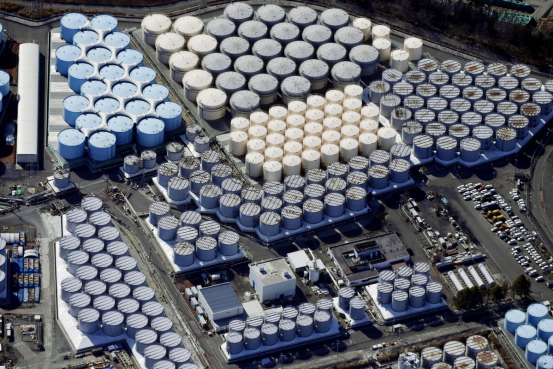China Urges Japan to Handle Contaminated Water Prudently

An aerial view shows the storage tanks for treated water at the tsunami-crippled Fukushima Daiichi nuclear power plant in Okuma town, Fukushima prefecture, Japan February 13, 2021. [Photo/Agencies]
China on Friday again urged Japan to prudently handle the issue of contaminated water from the crippled Fukushima nuclear plant based on full consultation with relevant countries and international institutions.
”The discharge of such contaminated water into the sea cannot be the first option, still less the only option. Japan has a responsibility to humanity and to future generations to review and reverse its wrong decision,” Zhao Lijian, Foreign Ministry spokesman, said at a news conference.
The Japanese government is now trying to disregard the morality and responsibility of the country, and is simply trifling with the health and safety of future generations of human beings, including the Japanese people, Zhao said.
”Japan should face up to the unanimous opposition of all countries, and consciously accept the substantial participation and supervision of the international community, including China, so that the process can take place in the full light of day,” he said.
His comments came as three UN human rights experts on Thursday expressed their deep regret over Japan’s decision to dump the contaminated water into the sea, saying the discharge could impact millions of lives and livelihoods in the Pacific region.
In a joint statement, three experts expressed concern that the 1 million tons of contaminated water could foster “considerable risks to the full enjoyment of human rights of concerned populations in and beyond the borders of Japan”.
The trio, Marcos A. Orellana, UN Special Rapporteur on toxics and human rights, Michael Fakhri, UN Special Rapporteur on right to food, and David Boyd, UN Special Rapporteur on human rights and the environment, called the Japanese government’s decision “very concerning” and “disappointing”.
They also voiced their concerns about the potential threats to human health and the environment resulting from the discharge of contaminated water into the Pacific Ocean.
”It comes after years of discussion and concerns raised by local communities-particularly the fishing community which was already severely hit by the 2011 (nuclear) disaster,” the independent experts noted.
The Japanese government argued that Advanced Liquid Processing System, an advanced system for pumping and filtration, was capable of removing radioactive isotopes present in the contaminated water.
However, the experts stressed that the filtered water still contains radioactive carbon-14 as well as strontium-90 and tritium, all of which have harmful radioactive charges that ALPS could not remove and “could pose risks to humans and the environment for over 100 years”.
Global concern
Meanwhile, the Democratic People’s Republic of Korea on Thursday night denounced Japan’s decision as a “threat to human existence”, the Korean Central News Agency reported.
”This is an unpardonable criminal decision posing a grave threat to the health and security of mankind and the ecological environment, which comes to be another clear instance showing Japan’s shamelessness and gangster-like nature,” the KCNA said in a commentary.
The Philippines on Thursday expressed deep concerns over Japan’s decision, being the first Southeast Asian country to do so.
Presidential spokesman Harry Roque said during a news briefing that he hopes nations, including those behind the pollution, follow legal principles, and pay for damages.
”The first principle is we are one ecosystem. The second principle is that we are interconnected and the third principle is that the polluter must pay,” he noted.
http://www.wuhu.gov.cn/English/News/30287341.html
